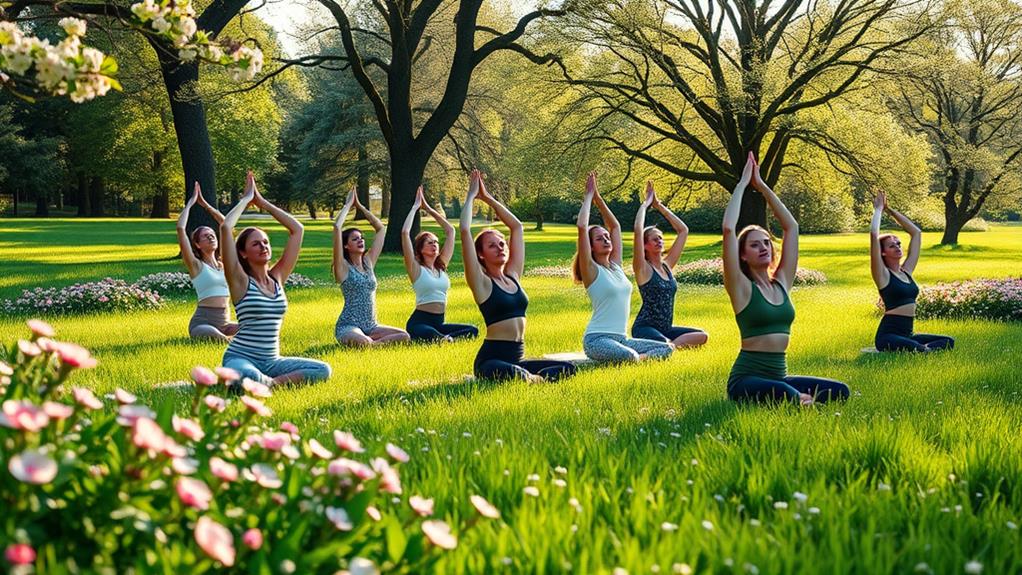To enhance your self-care, try mindfulness techniques like meditation, deep breathing, and body scans. These practices help you manage stress, promote relaxation, and improve overall well-being. You can start with just 3-5 minutes of daily meditation to clear your mind and incorporate deep breathing to calm your nerves. Body scans can increase your awareness of tension, allowing you to release it effectively. Additionally, consider mindful movement activities like yoga for both physical and mental health benefits. By exploring these techniques, you’ll uncover new ways to nurture yourself and cultivate a deeper connection with your well-being.
Key Takeaways
- Mindfulness meditation reduces stress and anxiety, promoting relaxation and mental clarity essential for women’s self-care.
- Body scans enhance awareness of physical tension, helping women identify and release stress in their bodies.
- Engaging in mindful movement practices like yoga improves physical health while fostering mental clarity and emotional well-being.
- Gratitude journaling cultivates positive thinking and emotional resilience, improving mood and reinforcing self-compassion.
- Incorporating deep breathing exercises calms the nervous system, supporting emotional regulation and overall mental health.
The Role of Mindfulness in Self-Care
Mindfulness plays an essential role in self-care, especially for women juggling various responsibilities and challenges. By incorporating mindfulness into your self-care routine, you can actively work on reducing stress and enhancing your mental well-being. Techniques like deep breathing exercises offer a simple yet powerful way to ground yourself, allowing you to manage anxiety and cultivate emotional regulation.
When you engage in daily mindfulness practices, you not only address immediate stressors but also build resilience against future challenges. This proactive approach helps prevent burnout, which is fundamental for maintaining balance in your life.
Furthermore, mindfulness has been linked to improved sleep quality, offering much-needed rest for those nights when stress keeps you awake.
As you become more mindful, you may notice an increase in self-compassion and self-esteem. Building a healthier relationship with yourself enables you to prioritize your needs without guilt.
Ultimately, regular mindfulness practice can lead to better immune function and overall health, making it a priceless tool in your wellness path. Embracing mindfulness isn’t just a trend; it’s an essential component of self-care that supports your physical, emotional, and mental health.
Key Mindfulness Techniques for Women
Finding ways to incorporate mindfulness into your daily routine can be life-changing for your self-care path. One effective technique is mindfulness meditation, which helps you manage stress and anxiety while nurturing mental and emotional well-being. Just a few minutes of deep, intentional breathing can create a calming effect that improves your focus throughout the day.
Another powerful practice is body scans. This meditation allows you to connect with your body, increasing awareness of tension and promoting relaxation.
You can also investigate mindful movement through activities like yoga or tai chi, which not only enhance physical health but also improve mental clarity and emotional resilience.
Gratitude journaling is another key self-care practice. Taking a few moments each day to jot down what you’re grateful for can greatly improve your mood and self-compassion, reinforcing positive thinking.
Additionally, consider using mindfulness apps to easily access guided meditations that fit into your busy schedule, making it easier to practice consistently.
These techniques can help you cultivate quality sleep and a more balanced emotional state, ultimately enhancing your self-care experience.
Daily Mindfulness Practices to Try

How can you seamlessly weave mindfulness into your daily life? Start by dedicating just 3-5 minutes to meditation each day. This simple breath-focused practice can enhance your mental clarity and emotional stability.
Next, try body scans to identify tension in your body. By tuning into those areas, you promote relaxation and increase body awareness, essential for reducing stress.
Incorporate deep breathing exercises throughout your day; they activate your body’s relaxation response and help regulate your emotions. Pair this with mindful movement, like yoga or even a slow walk, to blend physical health with mindfulness.
Another impactful practice is gratitude journaling. Each day, jot down three things you’re grateful for. This shift in focus can uplift your spirits and reinforce a positive mindset, making a significant difference in your self-care activities.
Benefits of Mindfulness for Emotional Health
Regularly practicing mindfulness can change your emotional health in meaningful ways. It’s been shown that engaging in mindfulness techniques, like meditation and deep breathing, can greatly reduce stress and anxiety levels, leading to a calmer emotional state. This is essential for enhancing your overall emotional health and well-being.
As you develop mindfulness, you’ll notice an increase in self-compassion and self-esteem, both important components of emotional resilience. You’ll become more aware of your feelings in real time, allowing you to respond to challenging emotions more healthily rather than suppressing them or reacting impulsively.
This heightened awareness also improves your coping strategies, enabling you to manage difficult emotions and steer through life’s challenges with greater ease.
Moreover, mindfulness can strengthen your relationships. By promoting empathy and reducing reactivity, you encourage more positive interactions, enhancing your social support network.
Each time you practice mindfulness, you’re not just investing in self-care; you’re building a foundation for emotional resilience that will serve you well in all aspects of your life. Accept these benefits, and watch your emotional health flourish.
Mindfulness Techniques for Stress Reduction

As mindfulness enhances emotional health, it naturally lends itself to effective stress reduction techniques. One powerful approach is deep breathing exercises. These mindfulness techniques calm your nervous system, promoting relaxation and emotional regulation.
You might also try body scan meditations to identify and release physical tension, which can help reduce anxiety and improve mental clarity.
Practicing gratitude through mindfulness is another excellent way to counterbalance stress. By focusing on what you appreciate, you cultivate positive thinking, elevating your emotional resilience in daily challenges.
Regular mindfulness meditation can greatly decrease cortisol levels—the stress hormone—enhancing your overall well-being and lowering the risk of stress-related health issues.
Incorporating mindful movement practices, like yoga or tai chi, allows you to combine physical activity with mindfulness, creating a powerful method for reducing stress.
These activities promote a sense of calm and balance in your daily life. By embracing these mindfulness techniques, you enable yourself in your self-care experience, nurturing not only a more relaxed state of mind but also a healthier, more resilient you.
Incorporating Mindfulness Into Routine
Incorporating mindfulness into your daily routine can change your self-care practices and enhance your overall well-being. Self-care means taking time for yourself, and integrating mindfulness techniques can be a significant part of that process.
Start with just 3-5 minutes of daily meditation focused on your breath. This simple practice can promote emotional regulation, reducing stress and improving your mood.
You might also consider performing body scan meditations regularly. This practice helps increase awareness of physical sensations and tension, allowing you to identify and release stress throughout your body.
Additionally, try incorporating deep breathing exercises into your day. Just a few minutes of intentional breathing can calm your nervous system, increase focus, and reduce anxiety.
Another great way to nurture mindfulness is through gratitude journaling. Taking a few moments each evening to jot down what you’re grateful for encourages a positive mindset.
Mindful Movement and Physical Wellness

Engaging in mindful movement is a powerful way to improve your physical wellness while nurturing your mental and emotional health. Practices like yoga, tai chi, and mindful walking not only promote enhancing flexibility, strength, and balance but also greatly reduce stress and anxiety.
By focusing on the present moment during these activities, you encourage a deeper connection with your body, helping you recognize your physical needs and limitations.
Research shows that incorporating mindful movement into your daily routine can lead to improved cardiovascular health, lower blood pressure, and an uplifting mood. This comprehensive approach to wellness integrates physical, mental, and emotional benefits, enabling you to take charge of your health.
For women dealing with chronic conditions like fibromyalgia or endometriosis, regular participation in mindful movement can alleviate symptoms and promote overall well-being.
Ultimately, practicing mindful movement is an essential aspect of self-care. It encourages you to listen to your body and cultivate a greater sense of self-worth.
Adopt these techniques, and you’ll not only improve your physical wellness but also enhance your entire life.
Building a Supportive Mindfulness Community
Mindful movement lays a strong foundation for personal wellness, but connecting with others who prioritize mindfulness can enhance its benefits. Building a supportive mindfulness community isn’t just about practicing together; it creates a space where you feel understood and motivated.
Engaging in group mindfulness activities, like meditation sessions or workshops, helps reduce feelings of isolation while improving your emotional well-being through shared experiences.
Research shows that community involvement in mindfulness practices can elevate self-compassion and resilience, which are essential for mental health. You can find online platforms and social media groups dedicated to mindfulness where women share resources, tips, and personal stories. These connections strengthen communal ties and inspire you to stay committed to your mindfulness path.
Moreover, participating in community service through mindfulness initiatives not only promotes personal growth but also instills a sense of purpose. When you contribute your skills and compassion to help others, you reinforce the positive impact of mindfulness on your self-care routine.
Overcoming Challenges in Mindfulness Practice

Steering through the challenges of mindfulness practice can feel overwhelming, especially with the demands of daily life pulling you in multiple directions.
However, overcoming these obstacles is possible with some practical strategies.
Consider the following tips to help you integrate mindfulness into your routine:
- Set clear intentions: Define what mindfulness means to you and why you want to practice it.
- Create a designated space: Having a specific area for mindfulness can reduce distractions and enhance focus.
- Use guided meditations: Apps and online resources can provide structure, helping you feel less intimidated as you start.
- Join a community support group: Engaging with others can motivate you and provide accountability, making it easier to maintain consistency.
Conclusion
Incorporating mindfulness into your self-care routine isn’t just a trend; it’s a life-changing expedition that nourishes your mind and spirit. By embracing these techniques, you’re not only enhancing your emotional well-being but also creating space for growth and resilience. Remember, like a garden, your practice will flourish with patience and care. So, cultivate those moments of mindfulness daily, and watch how they blossom into a healthier, more balanced you. You deserve this nurturing path.
Join our list
Subscribe to our mailing list and get interesting stuff and updates to your email inbox.

